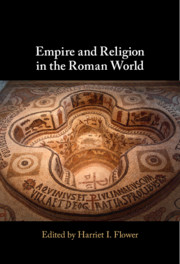Book contents
- Empire and Religion in the Roman World
- Empire and Religion in the Roman World
- Copyright page
- Frontispiece
- Contents
- Figures
- Table
- Contributors
- Acknowledgments
- Introduction
- Part I Empire
- Part II Religion
- Chapter 5 The First Christian Family of Egypt
- Chapter 6 Missionaries, Pious Merchants, Freelance Religious Experts, and the Spread of Christianity
- Chapter 7 Christian Piety in Late Antiquity
- Chapter 8 Ausonius at the Edge of Empire
- Chapter 9 Peregrinationes in Psalmos
- Chapter 10 Muḥammad’s Rivals
- Chapter 11 Brent Shaw
- Appendix: Bibliography of Brent D. Shaw’s Publications to 2020
- Index
- References
Chapter 8 - Ausonius at the Edge of Empire
Consular Poetics as Cognitive Improvisation
from Part II - Religion
Published online by Cambridge University Press: 26 August 2021
- Empire and Religion in the Roman World
- Empire and Religion in the Roman World
- Copyright page
- Frontispiece
- Contents
- Figures
- Table
- Contributors
- Acknowledgments
- Introduction
- Part I Empire
- Part II Religion
- Chapter 5 The First Christian Family of Egypt
- Chapter 6 Missionaries, Pious Merchants, Freelance Religious Experts, and the Spread of Christianity
- Chapter 7 Christian Piety in Late Antiquity
- Chapter 8 Ausonius at the Edge of Empire
- Chapter 9 Peregrinationes in Psalmos
- Chapter 10 Muḥammad’s Rivals
- Chapter 11 Brent Shaw
- Appendix: Bibliography of Brent D. Shaw’s Publications to 2020
- Index
- References
Summary
The visual and intertextual effects of Ausonius’ versified riverscape, the Mosella, make it a prize specimen for modern study of late antique Latin poetics and aesthetics. What kind of performance – and then what kind of a book – would this poem originally have been, in the empire of Valentinian and his sons, in the 370s and ’80s? The chapter measures the oddity of the Mosella, and of the poet’s oeuvre, against the background of prior fourth-century Latin opuscular poetizing, to argue that Ausonius’ “poetical fame” (Gibbon) was at once enabled by his profile as an imperial officeholder and an effect of his deliberately stepping aside from it. A following generation of Latin writers, many of whom would style Christian literary careers for themselves, may be seen reprising – if not emulating – the trick that Ausonius performed in improvising a personal poetic subjectivity at the edge of the cognitive ecology of Roman empire.
Keywords
- Type
- Chapter
- Information
- Empire and Religion in the Roman World , pp. 187 - 211Publisher: Cambridge University PressPrint publication year: 2021



